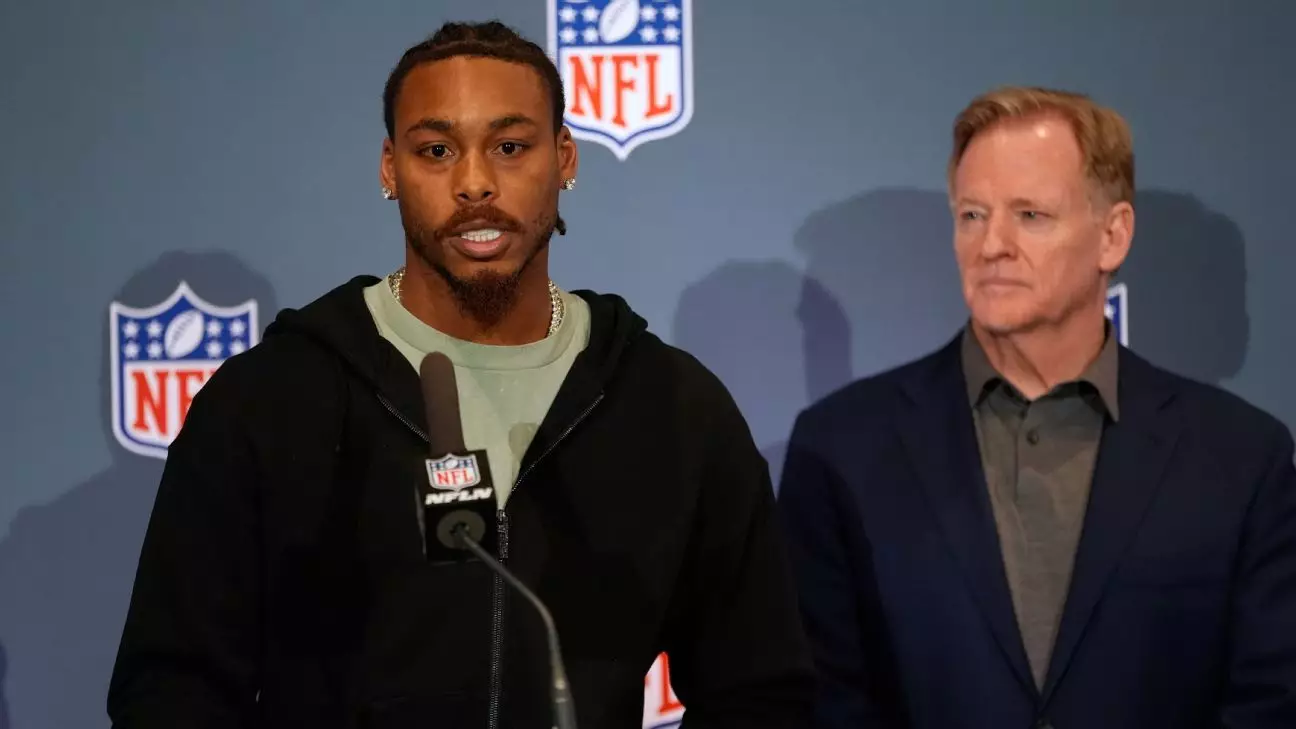In a groundbreaking move that promises to reshape the landscape of American football, the NFL’s recent decision to allow players to participate in flag football at the 2028 Olympic Games signifies more than just a shift in sporting events; it reflects a transformative trend towards global connectivity in athletics. The unanimous approval by NFL owners, celebrated with delight by stars like Justin Jefferson, marks a defining moment in the league’s history. With this decision, the NFL is not just providing its players with an unparalleled opportunity to showcase their skills on a world stage; it is championing a vision of inclusivity and expansion that extends across borders, challenging the notion that football can only thrive domestically.
Justin Jefferson: A Symbol of Hope and Inspiration
Justin Jefferson, the Minnesota Vikings’ dynamic wide receiver, embodies the spirit of this new opportunity. His jubilant “Olympic Griddy” at the announcement encapsulated an emotion felt by athletes across the nation—an exhilarating chance to chase the elusive Olympic dream. Jefferson’s reflections on his childhood aspirations to gain renown on an international level resonate deeply, familiar to anyone who has watched elites compete for gold in the Olympics. By embracing the opportunity to participate in flag football, he not only elevates his career, but also serves as a beacon of inspiration for young athletes everywhere. The NFL is leaning into a global future, shifting the narrative to one where the sport grows in popularity and prestige.
The NFL’s Vision of Expansion and Inclusion
NFL executive Troy Vincent underscored this vision, envisioning the Olympic platform as a stage for the “greatest athletes in the world.” The inclusion of flag football represents a fusion of traditional American football with international inclusivity, appealing to those who may have never engaged with the sport before. This initiative transcends mere participation; it articulates a communal narrative that sports can unite people, regardless of their backgrounds or origins. Integral to this narrative is the notion that athletes can potentially represent multiple countries, allowing for a tapestry of athletes to come forth and display their prowess on a grand scale.
The Challenges Ahead: Balancing Dual Athletics
However, the path to a cohesive Olympic experience is fraught with challenges. As players consider the prospect of competing in both the NFL and the Olympics, they face the daunting task of balancing the demands of two very distinct forms of the sport. NFL executive Peter O’Reilly’s comments about managing training schedules highlight the logistical complexities at play. While the timing can be adjusted to fit within the NFL calendar, the necessity for players to devote time to mastering the intricacies of flag football is paramount. This is not merely a game of conversion; it requires a shift in mindset, training, and technique that could differentiate those in the NFL from practitioners who have dedicated years to flag football.
Moreover, the selection process will inevitably bring challenges, as current stars weigh both personal aspirations and the reality of competing with flag specialists. As Vikings linebacker Brian Asamoah II acknowledged, flag football is not interchangeable with traditional football. The skills required to excel in one are subtly different from those needed for the other, and players entering the fray must approach the sport with the humility and respect it deserves.
Looking Ahead: The Future of Flag Football in the NFL
The road ahead, while paved with promise, is characterized by intricate negotiations with various stakeholders, including the NFL Players Association and Olympic committees. It’s essential for the league to safeguard its athletes while simultaneously fostering their ambitions to represent their countries. The detailed conversations about insurance and other protective measures reflect the nuanced complexities that accompany such a significant decision.
As the landscape of American football evolves, this initiative could herald a new age where flag football becomes a crucial aspect of the NFL’s mission: spreading the love for the game internationally. By fostering a culture of empowerment and enabling athletes to pursue diverse avenues, the league is not only enhancing the global visibility of the sport but also igniting the dreams of countless young players aspiring to make their mark on the world stage.
The coming years will be critical as the NFL navigates this uncharted territory, but if the excitement surrounding the prospect of Olympic participation is any indication, the future is undeniably bright. This revolutionary step represents an exciting time for both the NFL and aspiring football players everywhere.

